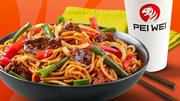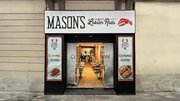Article
How one Canadian better-burger chain plans to win US marketshare
The founder and CEO of Big Smoke Burger is confident that Americans will embrace his concept.

November 8, 2013
Editor's note: This is just one story in a recurring series that features interviews with top-level execs in the fast casual industry. If you would like us to feature a specific exec, please make your request in an email to Cherryh Butler at cherryhb@fastcasual.com.
The better burger has been a staple in the American fast casual industry for several years, but a Canadian brand has recently joined the competition. Big Smoke Burger, which has nine units throughout Canada, debuted this summer in the United States with a Denver opening. The U.S. market, which is five times larger than the Canadian market, may be a hard sell for the Canadian chain, considering all the other burger chains enticing customers to bite into their brand. Mustafa Yusuf, founder and CEO of Big Smoke, isn't worried, however.
"Business (in Denver) has met our expectations; great feedback from customers," he said. "The poutine has been a hit in Denver."
Poutine is a Canadian comfort food consisting of fresh-cut fries topped with cheese and gravy.
 |
| Mustafa Yusuf |
Plans are underway to develop 70 more Big Smoke Burgers throughout the U.S., including in the large markets of New York in 2014, Chicago and Detroit, along with more in Denver, Canada and the Middle East, Yusuf said. The chain did about $ 8 million in sales last year and is on target to do $10 million this year.
FastCasual.com chatted with Yusuf about how he expects to compete with the numerous successful burger joints already thriving in the States.
Q: What makes your burger brand different from all the other fast casual burger joints?
Yusuf: Toronto is saturated with burger concepts, yet we also enjoy sales increases, new unit growth, and prime landlords approaching us, i.e. airports and toll roads. We offer a gourmet approach to burgers, which include the highest-quality beef that is flame grilled versus using the flat-top grill, and is always fresh, never frozen; all natural toppings and unique homemade sauces to give our burgers a distinct flavor; and the option to get chicken, lamb or veggie burgers instead of beef.
Q: Why did you decide to gamble on the U.S. market?
Yusuf: Fransmart, our franchise development partner, sees the same positioning opportunity in the U.S. as we are enjoying here.
Q: How will your marketing techniques differ in the U.S. compared to the Middle East and Canada?
Yusuf: We will keep the same marketing techniques in all of our markets: Real estate first, highest-quality operations second, local marketing/PR for awareness and trial, and then letting customers vote with their wallets.
Q: What is the growth plan? Corporate-owned stores or only franchises? What U.S. markets are you looking at?
Yusuf: We plan to expand with both corporate and franchise-owned stores. We have already locked up the entire Ontario market specifically for corporate growth. Currently, we have development deals in the U.S. for New York, Chicago, Denver and Michigan, and we are open to any of the popular metro areas where there is a demand for exciting, new fast casual concepts.
Q: How will you compete with well established better-burger brands like Fatburger, Smashbugher, Burger 21, Elevation, etc.?
Yusuf: We will compete with the U.S. brands the same way that we compete with the Canadian brands — better locations and better guest experience. The burger business is saturated across all of North America, and we will focus on converting weaker burger players as part of our penetration strategy just like we do here in Toronto.
Read more about operations management.
Cover photo: Big Smoke Burger's Poutine, a Canadian comfort food consisting of fresh-cut fries topped with cheese and gravy.
 ChatGPT
ChatGPT Grok
Grok Perplexity
Perplexity Claude
Claude












